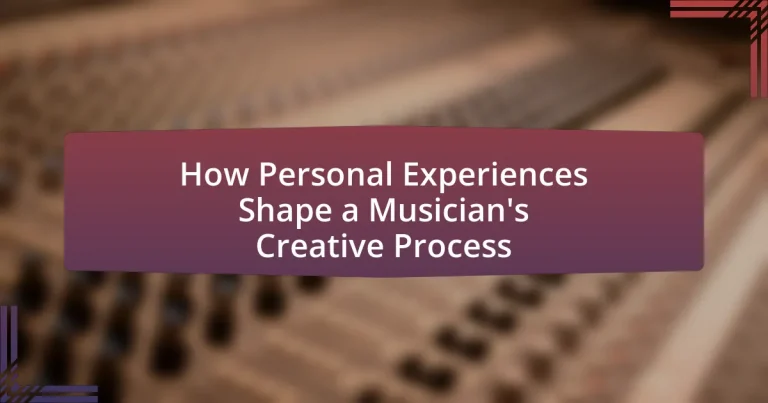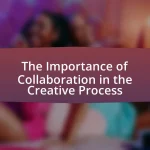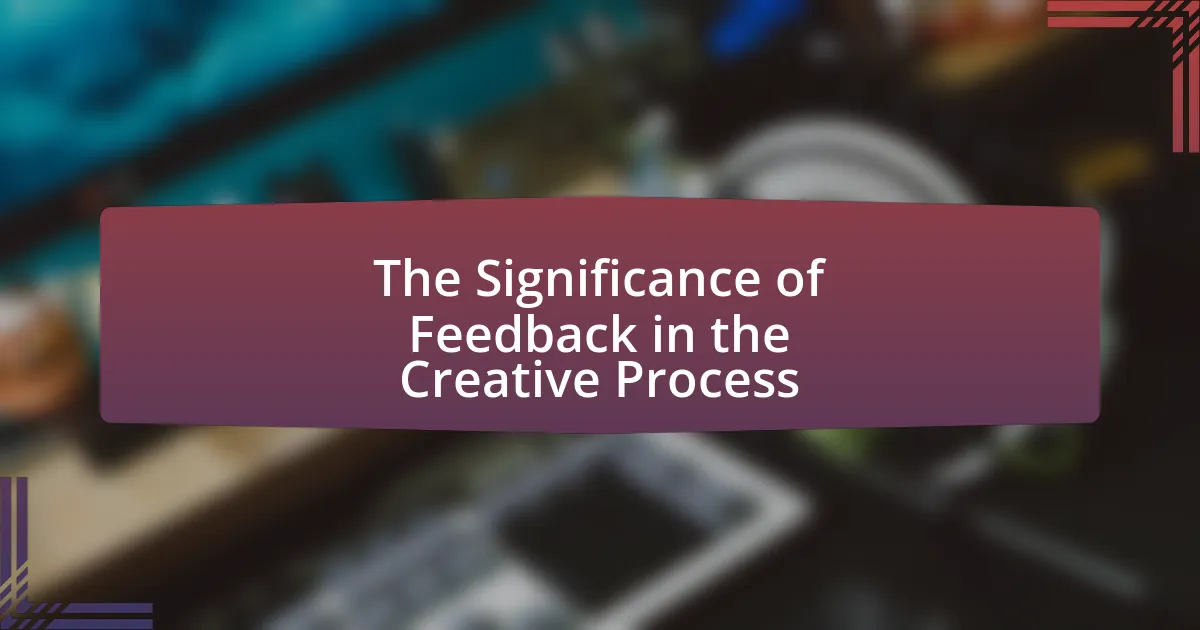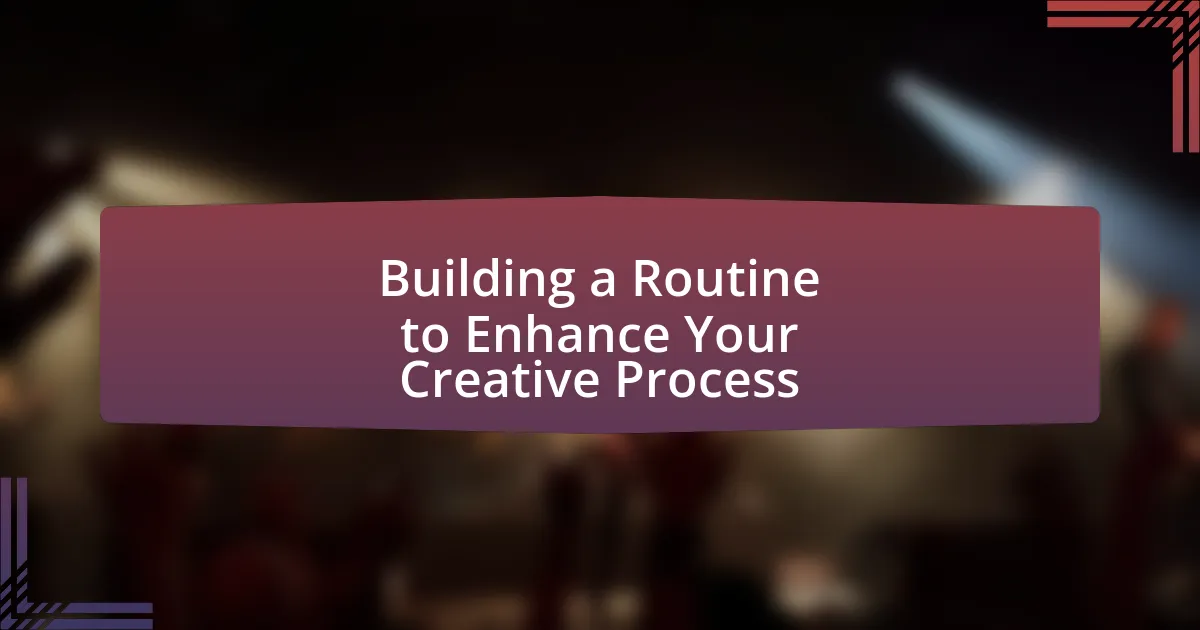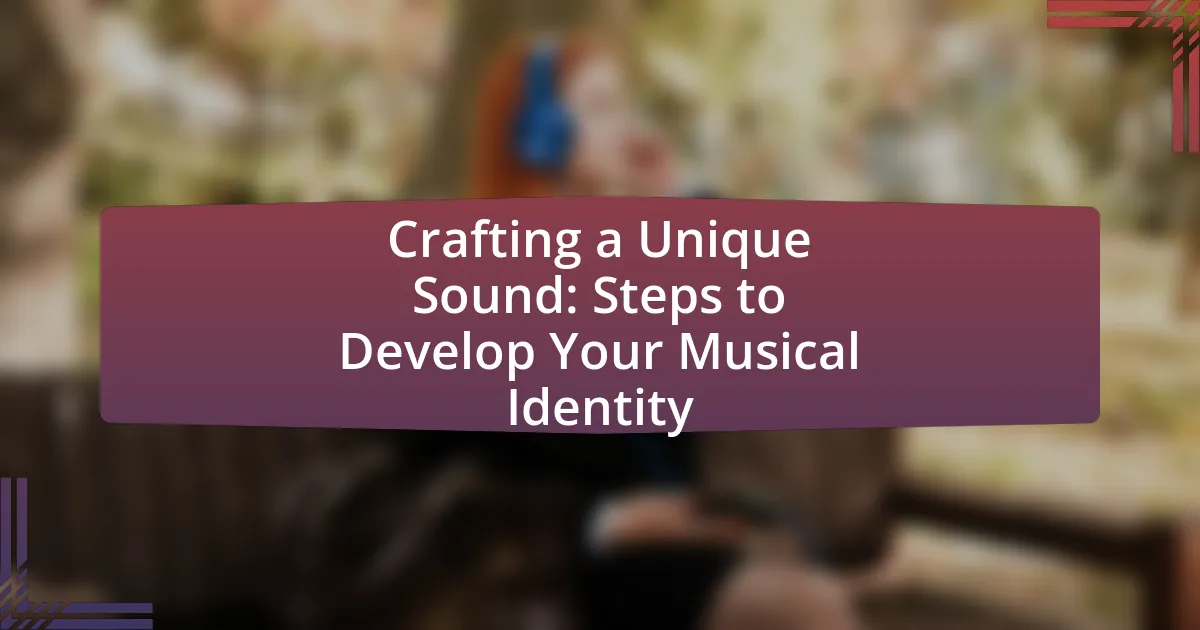The article explores how personal experiences shape a musician’s creative process, emphasizing the emotional depth and authenticity that these experiences bring to their work. It examines various influences, including emotional events, cultural backgrounds, and relationships, which significantly impact lyrical content and musical expression. The discussion highlights the importance of childhood experiences, self-reflection, and societal issues in shaping a musician’s message, as well as the psychological effects of personal narratives on creativity. Additionally, it addresses techniques musicians use to convey emotions, the role of collaboration, and strategies for maintaining authenticity in their artistic endeavors.
How do personal experiences influence a musician’s creative process?
Personal experiences significantly influence a musician’s creative process by providing emotional depth and authenticity to their work. Musicians often draw inspiration from their life events, relationships, and challenges, which shape their lyrical content and musical style. For instance, renowned artists like Taylor Swift and Eminem have openly discussed how their personal relationships and life struggles directly inform their songwriting, resulting in relatable and impactful music. This connection between personal experience and creativity is supported by research indicating that emotional experiences enhance artistic expression, allowing musicians to convey complex feelings and narratives through their art.
What types of personal experiences impact a musician’s creativity?
Personal experiences that impact a musician’s creativity include emotional events, cultural background, and life challenges. Emotional events, such as love, loss, or trauma, often serve as profound sources of inspiration, influencing lyrical content and musical expression. Cultural background shapes a musician’s style and influences their choice of instruments, rhythms, and themes, as seen in genres like jazz or folk music that reflect specific cultural narratives. Life challenges, including struggles with mental health or socioeconomic hardships, can also drive creativity, prompting musicians to channel their experiences into their art, as evidenced by the works of artists like Kurt Cobain and Amy Winehouse, who drew heavily from their personal struggles.
How do childhood experiences shape musical expression?
Childhood experiences significantly shape musical expression by influencing emotional development, cognitive skills, and cultural exposure. For instance, early exposure to music, whether through family, education, or community, fosters a connection to musicality that can enhance creativity and emotional expression in later life. Research indicates that children who engage with music during formative years develop better auditory skills and emotional intelligence, which are crucial for nuanced musical expression. A study by H. H. Hargreaves and A. C. North in “The Social Psychology of Music” highlights that childhood musical experiences contribute to identity formation and personal narrative, further impacting how individuals express themselves musically as adults.
What role do relationships play in a musician’s work?
Relationships significantly influence a musician’s work by providing emotional support, inspiration, and collaboration opportunities. These connections can shape the themes and narratives within their music, as personal experiences with friends, family, and romantic partners often serve as a source of lyrical content. For instance, many renowned musicians, such as Taylor Swift and Ed Sheeran, draw directly from their relationships to create relatable and impactful songs, demonstrating how interpersonal dynamics can enhance creativity and authenticity in their art.
Why are personal narratives important in songwriting?
Personal narratives are important in songwriting because they create authenticity and emotional resonance in the music. When songwriters draw from their own experiences, they craft lyrics that reflect genuine feelings and situations, allowing listeners to connect on a deeper level. Research shows that songs based on personal stories often resonate more with audiences, as they evoke empathy and relatability. For instance, a study published in the Journal of Music Therapy found that personal storytelling in music enhances emotional engagement, making the song more impactful. This connection between personal narratives and listener engagement underscores their significance in the songwriting process.
How do musicians translate personal stories into lyrics?
Musicians translate personal stories into lyrics by drawing on their own experiences, emotions, and reflections to create relatable narratives. This process often involves introspection, where artists identify significant life events or feelings that resonate deeply with them. For instance, Taylor Swift frequently incorporates her personal relationships and experiences into her songwriting, allowing listeners to connect with her emotions on a personal level. Additionally, studies show that autobiographical elements in music can enhance listener engagement, as evidenced by research published in the Journal of Music Psychology, which highlights how personal storytelling in lyrics fosters emotional connections between artists and audiences.
What techniques do musicians use to convey emotions from their experiences?
Musicians convey emotions from their experiences through techniques such as lyrical storytelling, melodic variation, and dynamic instrumentation. Lyrical storytelling allows musicians to articulate personal narratives, evoking specific feelings in listeners; for example, Bob Dylan’s “Tangled Up in Blue” reflects complex emotional experiences through vivid imagery. Melodic variation, including changes in pitch and rhythm, can express different emotional states; for instance, minor keys often convey sadness, while major keys can evoke happiness. Dynamic instrumentation, such as the use of crescendos and decrescendos, enhances emotional impact by creating tension and release, as seen in Beethoven’s symphonies. These techniques are rooted in the musicians’ personal experiences, allowing them to connect deeply with their audience.
How do cultural backgrounds affect a musician’s creative output?
Cultural backgrounds significantly influence a musician’s creative output by shaping their musical style, themes, and techniques. For instance, musicians from diverse cultural backgrounds often incorporate traditional instruments, scales, and rhythms unique to their heritage, which can lead to innovative fusions of genres. Research indicates that cultural identity plays a crucial role in artistic expression; a study by the University of California found that musicians who draw from their cultural roots tend to produce more authentic and emotionally resonant music. This connection to cultural heritage not only enriches their work but also allows them to communicate personal and collective narratives through their art.
What influences do cultural traditions have on musical style?
Cultural traditions significantly influence musical style by shaping the themes, instruments, rhythms, and performance practices within a community. For instance, traditional African music often incorporates polyrhythms and call-and-response patterns, reflecting communal values and social structures. Similarly, the use of specific instruments, such as the sitar in Indian classical music, is rooted in cultural heritage and spiritual practices, which dictate the musical scales and modes employed. These elements are not only reflective of the cultural identity but also serve to transmit historical narratives and social norms, thereby reinforcing the connection between music and cultural expression.
How do societal issues shape a musician’s message?
Societal issues significantly shape a musician’s message by influencing the themes, lyrics, and overall tone of their work. Musicians often draw inspiration from the social, political, and economic contexts in which they live, reflecting the struggles and triumphs of their communities. For example, artists like Bob Dylan and Public Enemy have used their music to address civil rights, social justice, and inequality, resonating with audiences who share similar experiences. This connection to societal issues not only enhances the authenticity of their message but also fosters a sense of solidarity among listeners, as seen in the widespread impact of protest songs during movements such as the Civil Rights Movement and more recent social justice campaigns.
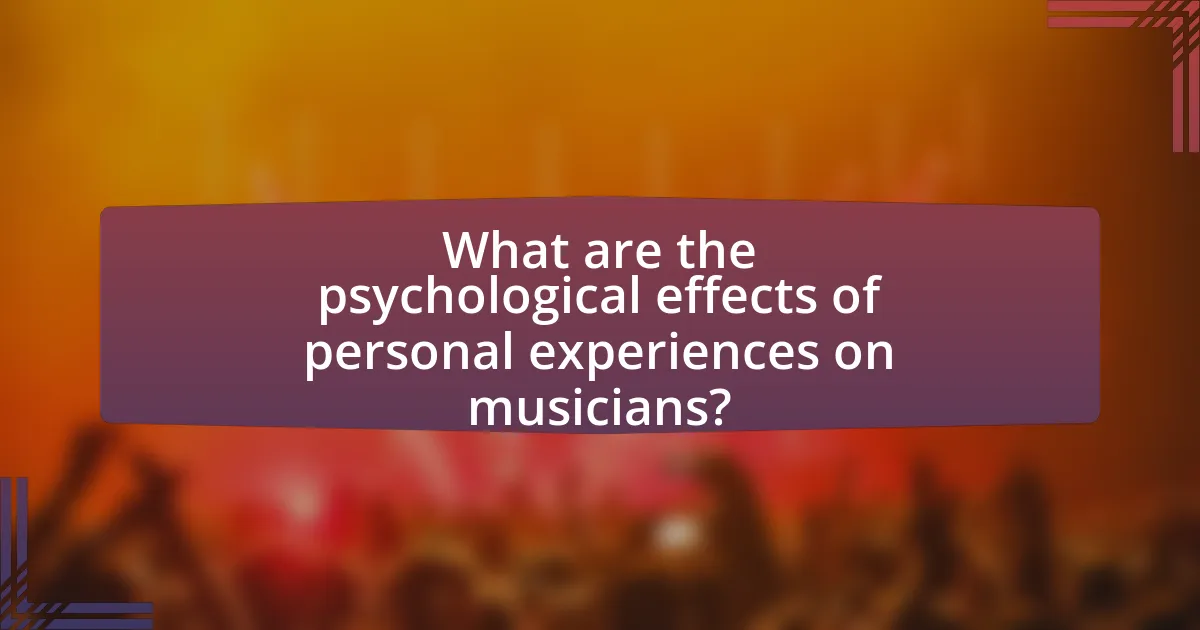
What are the psychological effects of personal experiences on musicians?
Personal experiences significantly influence musicians’ psychological states, often shaping their creativity and emotional expression. These experiences can lead to heightened emotional sensitivity, which allows musicians to convey deeper feelings through their music. For instance, research indicates that musicians who have faced trauma or significant life events often channel these experiences into their songwriting, resulting in more authentic and relatable content. A study published in the Journal of Music Therapy by Bradt and Dileo (2014) found that personal narratives can enhance emotional processing and resilience in musicians, demonstrating how their psychological well-being is intertwined with their creative output.
How do emotions from personal experiences manifest in music?
Emotions from personal experiences manifest in music through lyrical content, melody, and instrumentation that reflect the artist’s feelings and memories. Musicians often draw upon their life events, such as love, loss, or joy, to create relatable narratives and evoke specific emotional responses in listeners. For instance, studies show that songs written about personal trauma or significant life changes tend to resonate deeply with audiences, as they tap into universal human experiences. This connection is evident in genres like blues and folk, where storytelling is central, and artists like Taylor Swift and Eminem frequently incorporate autobiographical elements into their work, illustrating how personal emotions shape their creative output.
What psychological theories explain the connection between experience and creativity?
Psychological theories that explain the connection between experience and creativity include the Componential Theory of Creativity, the Investment Theory of Creativity, and the Flow Theory. The Componential Theory, proposed by Teresa Amabile, posits that creativity arises from the interaction of intrinsic motivation, domain-relevant skills, and creativity-relevant processes, suggesting that personal experiences enhance these components. The Investment Theory, developed by Robert Sternberg and Todd Lubart, asserts that creative individuals are like good investors who recognize the value of their experiences and ideas, leading to innovative outcomes. Flow Theory, introduced by Mihaly Csikszentmihalyi, describes a state of deep engagement where individuals draw upon their experiences to achieve high levels of creativity, indicating that immersive experiences can significantly boost creative output. These theories collectively highlight how varied personal experiences contribute to the creative process in musicians and other artists.
How can personal trauma influence a musician’s work?
Personal trauma can profoundly influence a musician’s work by shaping their emotional expression and thematic content. Musicians often channel their experiences of trauma into their lyrics, melodies, and overall artistic direction, allowing them to process and communicate their pain. For instance, artists like Kurt Cobain and Amy Winehouse have openly discussed how their struggles with mental health and personal loss informed their music, resulting in deeply resonant and relatable songs. Research indicates that emotional experiences, including trauma, can enhance creativity by fostering a unique perspective, as seen in studies that link emotional depth to artistic output. This connection between trauma and creativity underscores how personal experiences can serve as a catalyst for artistic innovation and authenticity in a musician’s work.
Why is self-reflection important for musicians?
Self-reflection is important for musicians because it enhances their creative process and personal growth. By engaging in self-reflection, musicians can critically assess their artistic choices, identify strengths and weaknesses, and understand their emotional responses to music. This introspection allows them to refine their skills and develop a unique artistic voice. Research indicates that self-reflection fosters greater emotional intelligence, which is crucial for musicians to connect with their audience and convey authentic emotions through their work.
How do musicians use journaling or other methods for self-reflection?
Musicians use journaling and other methods for self-reflection to enhance their creative process and emotional awareness. By documenting thoughts, experiences, and emotions, musicians can identify patterns in their feelings and creative impulses, which can lead to more authentic songwriting and performance. Research indicates that reflective practices, such as journaling, can improve emotional intelligence and self-awareness, both crucial for artistic expression. For example, a study published in the Journal of Music Therapy found that musicians who engaged in reflective writing reported increased clarity in their artistic goals and a deeper connection to their music.
What impact does self-awareness have on a musician’s creative process?
Self-awareness significantly enhances a musician’s creative process by enabling them to understand their emotions, motivations, and artistic identity. This understanding allows musicians to create more authentic and relatable music, as they can draw from their personal experiences and feelings. Research indicates that self-aware musicians are better at expressing their individuality, which can lead to unique soundscapes and innovative compositions. For instance, a study published in the Journal of Music Therapy by Bradt and Dileo (2014) found that musicians who engage in self-reflection often produce work that resonates more deeply with audiences, demonstrating the direct correlation between self-awareness and creative output.
How do musicians cope with the pressures of personal experiences?
Musicians cope with the pressures of personal experiences by channeling their emotions into their creative work, often using songwriting and performance as therapeutic outlets. This process allows them to express feelings of pain, joy, or conflict, transforming personal struggles into relatable art. Research indicates that many musicians report that their best work emerges from periods of emotional turmoil, as seen in the case of artists like Kurt Cobain and Adele, who have openly discussed how their life experiences influenced their music. This connection between personal experience and creativity not only helps musicians manage their emotional states but also resonates with audiences, creating a shared understanding of human experiences.
What strategies do musicians employ to manage stress and anxiety?
Musicians employ various strategies to manage stress and anxiety, including mindfulness practices, physical exercise, and social support. Mindfulness techniques, such as meditation and deep breathing, help musicians focus and reduce anxiety levels, as evidenced by studies showing that mindfulness can lower stress hormones. Physical exercise, including activities like yoga or running, is also commonly used, as it releases endorphins that improve mood and alleviate stress. Additionally, musicians often seek social support from peers or mentors, which has been shown to enhance emotional resilience and provide coping mechanisms during challenging times. These strategies collectively contribute to a healthier mental state, enabling musicians to maintain their creative processes effectively.
How can support systems aid musicians in their creative journey?
Support systems can significantly aid musicians in their creative journey by providing emotional, financial, and logistical support. Emotional support from family, friends, and mentors fosters resilience and encourages experimentation, which is crucial for creativity. Financial backing from grants or sponsorships allows musicians to focus on their art without the stress of economic constraints. Logistical support, such as access to rehearsal spaces or professional networks, facilitates collaboration and exposure, enhancing creative opportunities. Research indicates that musicians with strong support systems report higher levels of satisfaction and creativity in their work, demonstrating the tangible benefits of these networks in the artistic process.
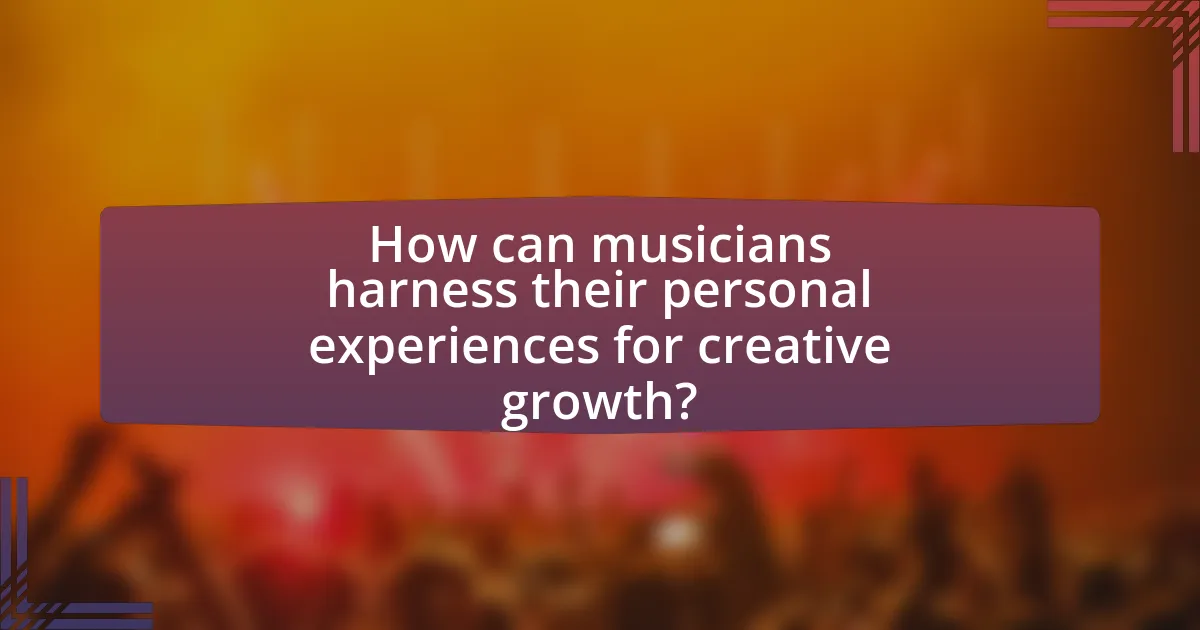
How can musicians harness their personal experiences for creative growth?
Musicians can harness their personal experiences for creative growth by integrating their life stories, emotions, and challenges into their music. This process allows them to create authentic and relatable content that resonates with audiences. For instance, studies show that artists who draw from personal narratives often produce more impactful and emotionally charged work, as seen in the autobiographical songs of artists like Taylor Swift and Eminem, which reflect their real-life experiences and struggles. By channeling their unique perspectives and feelings into their art, musicians not only foster their own creativity but also connect deeply with listeners, enhancing their artistic expression and growth.
What practices can musicians adopt to integrate personal experiences into their work?
Musicians can adopt practices such as journaling, improvisation, and storytelling to integrate personal experiences into their work. Journaling allows musicians to document their thoughts and emotions, which can later be transformed into lyrics or melodies. Improvisation encourages spontaneous expression, enabling musicians to channel their feelings directly into their performance. Storytelling, whether through lyrics or spoken word, helps convey personal narratives, making the music relatable and authentic. These practices are supported by research indicating that personal reflection enhances creativity, as seen in studies by Csikszentmihalyi, which highlight the connection between self-awareness and artistic expression.
How can collaboration with other artists enhance personal storytelling?
Collaboration with other artists enhances personal storytelling by introducing diverse perspectives and techniques that enrich the narrative. When musicians work together, they can blend their unique experiences and styles, resulting in a more layered and multifaceted story. For instance, a study by the University of Southern California found that collaborative songwriting often leads to more innovative and emotionally resonant music, as artists draw from each other’s strengths and insights. This synergy not only broadens the emotional depth of the storytelling but also allows for the exploration of themes that may not have been addressed in isolation.
What role does experimentation play in exploring personal themes in music?
Experimentation plays a crucial role in exploring personal themes in music by allowing artists to push boundaries and discover new ways to express their emotions and experiences. Through experimentation, musicians can blend genres, utilize unconventional instruments, and adopt innovative production techniques, which can lead to a deeper understanding of their personal narratives. For instance, artists like Björk and Radiohead have used experimental sounds and structures to convey complex emotional landscapes, illustrating how such approaches can enhance the authenticity and relatability of their work. This process not only fosters creativity but also enables musicians to connect with their audience on a more profound level, as the unique soundscapes often resonate with listeners’ own experiences.
How can musicians effectively share their personal stories with audiences?
Musicians can effectively share their personal stories with audiences by integrating autobiographical elements into their lyrics and performances. This approach allows artists to create a deeper emotional connection with listeners, as personal narratives resonate on a human level. For instance, artists like Taylor Swift and Ed Sheeran have successfully utilized their life experiences in songwriting, leading to widespread acclaim and relatability. Research indicates that storytelling in music enhances audience engagement, as it fosters empathy and understanding, making the experience more impactful.
What are the best platforms for musicians to express their experiences?
The best platforms for musicians to express their experiences include social media networks like Instagram and TikTok, music streaming services such as SoundCloud and Bandcamp, and dedicated artist platforms like Patreon. These platforms allow musicians to share personal stories, engage with fans, and showcase their creative processes. For instance, Instagram’s visual storytelling capabilities enable artists to post behind-the-scenes content, while TikTok’s short-form videos facilitate quick, impactful storytelling. SoundCloud and Bandcamp provide musicians with the ability to upload and share their music directly, often accompanied by personal narratives about their creative journeys. Additionally, Patreon allows artists to connect with their most dedicated fans through exclusive content, fostering a deeper understanding of their experiences.
How can live performances amplify the emotional connection with audiences?
Live performances amplify the emotional connection with audiences by creating an immersive and shared experience that fosters real-time interaction. During a live show, musicians can convey their emotions through vocal delivery, body language, and stage presence, which resonates with the audience on a personal level. Research indicates that the collective experience of live music can trigger the release of oxytocin, a hormone associated with bonding and emotional connection, enhancing the audience’s engagement and emotional response. Furthermore, the spontaneity of live performances allows for unique interpretations of songs, making each performance feel special and personal to the audience, thereby deepening their emotional investment in the music.
What are some tips for musicians to maintain authenticity in their creative process?
Musicians can maintain authenticity in their creative process by staying true to their personal experiences and emotions. This involves drawing inspiration from their own life stories, struggles, and triumphs, which can lead to more genuine and relatable music. Research indicates that artists who incorporate personal narratives into their work often resonate more deeply with audiences, as seen in the success of artists like Taylor Swift and Ed Sheeran, who frequently reference their own experiences in their lyrics. Additionally, musicians should avoid conforming to industry trends that do not align with their artistic vision, as this can dilute their unique voice. By prioritizing self-expression over commercial appeal, musicians can cultivate a distinctive sound that reflects their individuality.
